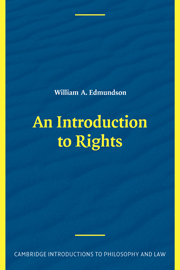Book contents
- Frontmatter
- Contents
- List of Tables
- Preface
- Part One The First Expansionary Era
- 1 The Prehistory of Rights
- 2 The Rights of Man: The Enlightenment
- 3 “Mischievous Nonsense”?
- 4 The Nineteenth Century: Consolidation and Retrenchment
- 5 The Conceptual Neighborhood of Rights: Wesley Newcomb Hohfeld
- Part Two The Second Expansionary Era
- Bibliographical Notes
- References
- Index
2 - The Rights of Man: The Enlightenment
Published online by Cambridge University Press: 08 January 2010
- Frontmatter
- Contents
- List of Tables
- Preface
- Part One The First Expansionary Era
- 1 The Prehistory of Rights
- 2 The Rights of Man: The Enlightenment
- 3 “Mischievous Nonsense”?
- 4 The Nineteenth Century: Consolidation and Retrenchment
- 5 The Conceptual Neighborhood of Rights: Wesley Newcomb Hohfeld
- Part Two The Second Expansionary Era
- Bibliographical Notes
- References
- Index
Summary
The concept of rights first became unmistakably prominent during the period of modern intellectual history known as the Enlightenment, which for our purposes had its beginnings in the early seventeenth century and ran to the end of the eighteenth. It was a period in which both the Church and the ancient Greek authorities (which had been recovered during the Renaissance) began to be questioned, and the order of the natural world began to be seen as capable of being understood by means very different from those that Renaissance scholars and church scholastics had hitherto been accustomed to using. Francis Bacon's turning away from scholastic to experimental methods of investigating the world marks the beginning of this period, and we can think of it as ending with (if not culminating in) two political revolutions: the American and the French, which defined the first expansionary period. What began as a new, antidogmatic and inquisitive approach to the study of nature was applied to human affairs, and with consequences that are still unfolding.
A subjective concept of rights – subjective in focusing in an important but as yet unspecified way upon the right-holder – had already emerged at least as early as the late Middle Ages, in disputes among Catholic clerics. It would be a mistake to regard this emergence as an unambiguous mark of moral progress, however.
- Type
- Chapter
- Information
- An Introduction to Rights , pp. 15 - 40Publisher: Cambridge University PressPrint publication year: 2004
- 1
- Cited by

